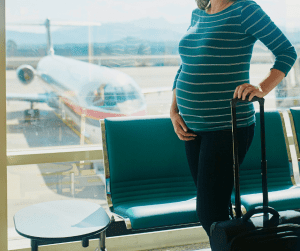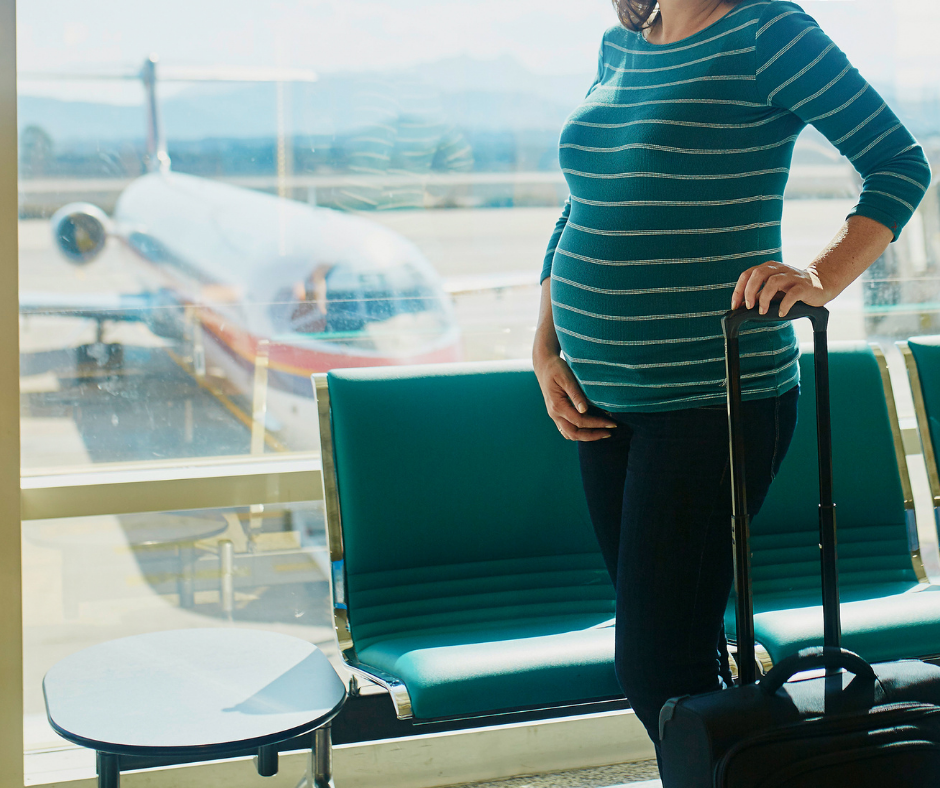With summer quickly approaching and the weather getting warmer, I know that many of you are dreaming of far off destinations. Now that traveling season has officially opened, many of you are wondering if it is safe to travel while pregnant. Maybe you are motivated by seeing loved ones, family members or friends before your little one arrives. Perhaps you have a special event that requires traveling a distance by car, or it’s time to board a plane for that well-awaited tropical vacation.
Even if you are pregnant, you can definitely travel! So, pack your bags, you have permission to set sail for that babymoon! But first, let’s make sure you do it safely. Here are some pregnancy travel tips to keep in mind while traveling.
8 Pregnancy Travel Tips
1. KEEP AN OPEN LINE OF COMMUNICATING WITH YOU CARE PROVIDER.
Be sure to speak to your care provider about your upcoming trip. Your doctor or midwife should be notified so that they can provide you with specifics on your pregnancy. Specific factors, like how far along you are in your pregnancy, where you are traveling to and any predisposed risk factors you may have are all important aspects of traveling safely while pregnant.
Your provider knows your situation best and will be able to provide you with the best guidance on safety. It is always important to maintain good communication with your care team especially if you are in your second and third trimesters. Also, if any questions arise during your trip they will be able to help you. For example, when I was traveling to Hawaii for a babymoon our dinner cruise company had a policy where no pregnant women were allowed on the cruise. I made a quick call to my doctor and she sent over a permission note allowing me to join on the dinner cruise.
2. RESEARCH YOUR DESTINATION FOR ANY RISKS TO PREGNANT WOMEN.
Your care provider can provide you with important health information about your travel destination. Also, check the government health websites to ensure there are not any outbreaks of diseases known in that area that can be a risk to pregnant women. You can visit www.cdc.gov/travel or do a quick Google search of your destination to learn about any infectious diseases that may be of concern at your destination.
3. MAKE SURE YOUR DESTINATION IS PREGNANCY FRIENDLY.
You probably won’t be doing any kind of river rafting or extreme sports while pregnant on your trip. Make sure the friends you are traveling with are also aware of these high-risk activities related to pregnancy. If you are early in your pregnancy you may have to communicate this to others. You shouldn’t be doing any arduous and long hiking.
Also, be mindful of boat trips. While pregnant, you may be predisposed to nausea or experiencing motion sickness on car and boat rides. I learned this the hard way while traveling in Alaska during my first few weeks of pregnancy. I hadn’t yet told anyone I was pregnant and we took a boat trip through the fjords to see the glaciers and it was far from an enjoyable experience with the nausea I felt, although the sights were beautiful.
4. INQUIRE WITH YOUR SPECIFIC AIRLINE ON THEIR RULES.
If you are at or close to 36 weeks in your pregnancy be aware that some airlines may request written permission from your doctor to allow you to fly. In most cases, your doctor can provide a travel certificate that grants you permission. The travel certificate should list what week of pregnancy you are in. Be sure to check with the airline because it varies from airline to airline. International flights typically do require a travel certificate so be prepared. Be aware that you are considered early term at about 37 weeks so you may not want to be traveling at this point since you can go into labor at any time.
5. REQUEST AN AISLE SEAT.
Pregnancy Travel Tip number five, if you are flying try to book an aisle seat. You will want to be on the aisle for a variety of reasons, one being you will probably be making many trips to the bathroom. As your uterus expands later in pregnancy your bladder will need to be emptied more often because baby now takes up that space and impedes on your bladder’s ability to expand to its full capacity. Also, you will want to stay very hydrated. Staying well hydrated will help eliminate some discomfort of early uterine tightening, known as Braxton Hicks. You will also want to get up to stretch or walk around during your trip. Getting up and moving will help with swelling around your legs and ankles which is common later in pregnancy and often exacerbated by long trips.
6. KEEP YOUR BODY HEALTHY.
Ensure you get plenty of rest leading up to your trip and throughout your travel. Drink a lot of water to stay hydrated, avoid heavy foods that are known to cause gas and indigestion. You may want to pack some common over-the-counter medications that help with heartburn and gas if it sneaks up on you. Take frequent breaks and again, get up and walk around as much as you can to help keep your blood circulating. Always listen to your body throughout your trip. If it tells you it needs rest, take a nap.
7. WEAR YOUR COMFIEST CLOTHES.
Loose fitting and stretchy clothes are highly recommended. A maternity bra that is soft and flexible is best. Wear comfy shoes you can slide on and off easily. If you will be walking a lot on your trip, pack shoes that have good support. Compression socks are advised if you are prone to swelling. They may even help prevent blood clots if you are susceptible to them.
8. DON’T FORGET TO PACK YOUR IMPORTANT PREGNANCY RELATED ITEMS.
Remember your prenatal vitamins, supplements and any prescriptions. You may also want to pack a belly bandit belt that can support the weight of your growing belly and help support your back.
Pregnancy Travel Tips
I hope these 8 pregnancy travel tips help you feel prepared and less anxious about traveling. Have fun! Bon Voyage!

















